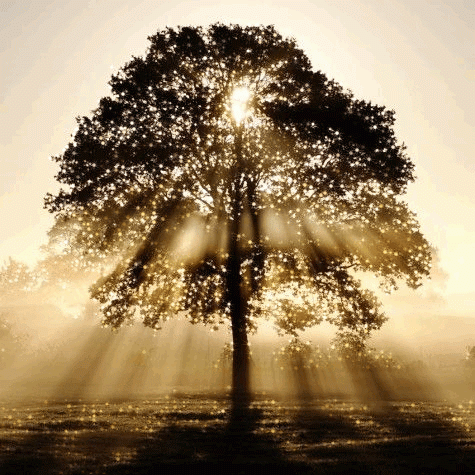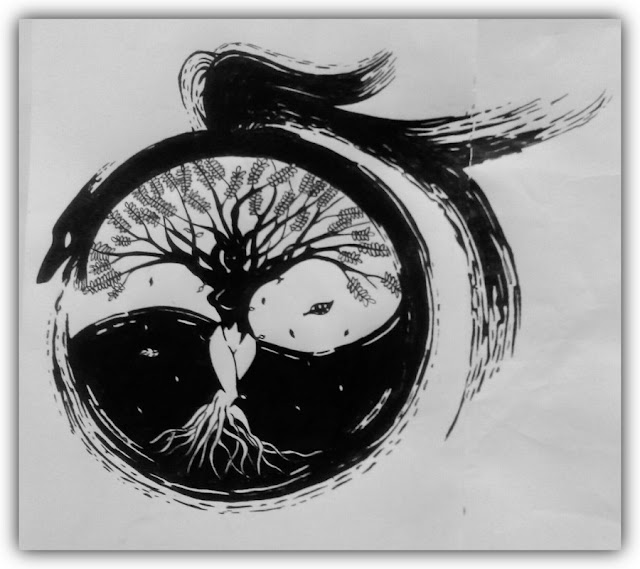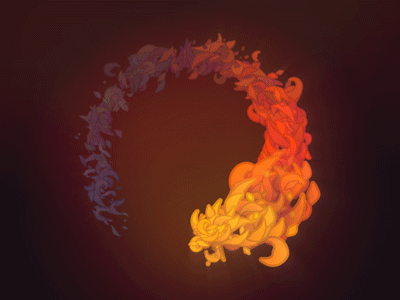Eschatology
Time is cyclical. The Alpha and the Omega are one. The past is the farther future, and the future is the farther past. In this more distant past, after the several cosmic realms had been established, after all souls in the afterlife had successfully completed their trials, after those in Prqjótjom (‘purgatory’) had arrived in Peridhóighos (‘paradise’) and those in Kréqa (‘limbo’) had reached Ndhérom (‘inferno’), then all of the gods began to prepare for the final battle over the act of creation. The creation of the beginning of time would take place from the end of time. Pltáwija Matér, Djéus Patér, Anséwes (‘the spiritual gods’), and Djéwes (‘the celestial gods’) were determined to create the multiverse of reality. They knew that only within universes wherein those gods amenable to creation happen to become the dominant gods would the physical creation actually take place. When the multiverse was to be created and the acorn of creation was to be planted in the cosmic ground, Kréuna, Wélnos, and Dhwosos (‘the demons’) set out to prevent the creation. The demons were motivated by compassion for those who would inevitably suffer in life were the creation to proceed. The goddess of fecundity, Dhéghom Matér, aware of the opposition by the demons, gave the acorn to the matriarch of Mágnos (‘the giants’), the powerful and sympathetic giantess Jéma, to guard until it was safe to plant. When the lord of the demons, Wélnos, learned that Jéma possessed the acorn, he emerged from Ndhéros Ghórdhjos (‘the palace of inferno’) and confronted her in Kréqas Kómwoirjom (‘the court of limbo’), demanding that she surrender the acorn to him. Jéma refused and fled from the demon forces to purgatory. She sought refuge within the safety of Prqjótjos Kastérlom (‘the castle of purgatory’). Wélnos then summoned Mánus, the hero deity, planning to poisoning hios (her/his/their) thoughts against Jéma. Wélnos told hirm (her/him/them) that Jéma intended to destroy the acorn in order to subvert the wishes of the supreme goddess, Óljamma. He claimed that it was Jéma’s ambition to usurp the position of Óljamma. He desired not only to prevent the creation but also to sow strife and subvert the truce between the spiritual gods and the celestial gods. Summoning their legions of demons, Kréuna and Wélnos laid siege to the castle of purgatory. This was the beginning of Kémelos Nbhudhnósqe Dsa [/ˈkɛmɛlɔs nbhʊdhˈnɔskwɛ ˈtsa/] 🔊 (‘the war of heaven and hell’).
The castle’s defenses held against the siege for a time. Mánus confronted Jéma and insisted that she surrender the acorn to hir (her/him/them). She refused, and Mánus then demanded to know the location of the acorn. Jéma responded that she had hidden it in a place where no one would ever find it. Mánus, feeling no other choice remained, betrayed and attacked Jéma. Mánus slew her to deny her the opportunity of destroying the acorn at some later time. Jéma died just as Kréuna, Wélnos, and their demons finally broke through the defenses of the castle of purgatory. Wélnos then declared himself absolute ruler of the three realms of inferno, limbo, and purgatory. An exhaustive search was conducted for the acorn, but no trace of it could be found. Wélnos ordered that Jéma’s body was to be buried in a remote place far from the gods, across the waters of Pósticita, in the center of the cosmic ground amid the distant mortal region of Médhighordhos (‘midrealm’), at the edge of Wástoudn (‘wasteland’). Wélnos then summoned his son Pérqunos, the god of thunder, to unleash a powerful bolt of lightning upon the spot whereunder Jéma had been buried, to serve as a warning to Óljamma, and to anyone else, against any further attempts at creation. Meanwhile, Néptonos, the god of the ocean deep, organized both the spiritual gods and the celestial gods together for a counter-attack against the distracted demons, pushing the demons back and successfully reconquering the region of purgatory. Wélnos nevertheless felt confident that the acorn of creation had been lost forever and that the multiverse of reality would thus never be (re)created.
In time, from the place whereunder Jéma had been buried, a sprout appeared, for when the castle of purgatory had been about to fall to the demons, the giantess had concealed the acorn deep within her own body, to hide it from Wélnos. Eventually, a great oak tree grew from that sprout. The tree was Dhóubnos Gróbhos, the world oak tree of reality, the cosmic ‘tree’ of the branching multiverse of living universes. More than merely a symbol for the biological tree of life, the world tree represented the cosmological tree of life. It grew from the point of creation (the initial Big Bang) in the cosmic ground, through our everyday mortal world of midrealm, sending its branches high into Kémelom (‘heaven’), through purgatory, crowning and blossoming in paradise, and sending its roots deep into Nbhudhnóm (‘hell’), through limbo, reaching the depths of inferno. The great oak tree incorporated within it all of the various elements of the body of the giantess Jéma—her bones became the rocks of the world, her flesh became the soil, her blood and sweat became the rivers and oceans, her hair became the flora, her breath became the wind, her skull became the vault of the sky. The sacred tree had thus given reality to that which had before been only potential. The multiverse had become physically real. Wélnos and his demon forces of hell, determined to uproot the world tree and destroy it forever, launched an all out assault against heaven. The opposing factions of gods waged a final battle that would prove to be cataclysmic. All of the gods were ultimately destroyed in that war of heaven and hell. Yet, like a serpent who devours its own tail, the gods were from death reborn (including Jéma) in other realities. Indeed, the magnificent oak tree soon produced a plenitude of acorns of its own, deposited endlessly in alternate multiverses, for subsequent cycles of creation. Every universe wherein the gods evolved, and further wherein the heavenly forces defeated the forces of hell, would in the end create anew the entire multiverse as a whole. Thus would the one identical and colossal multiverse propagate from every fertile universe within it, prolifically, exponentially, endlessly, forever.







